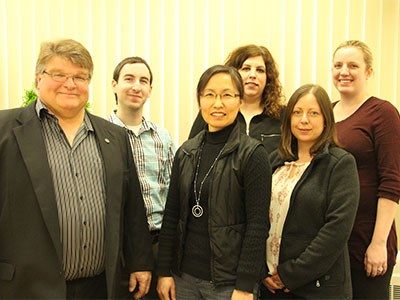Murad Al-Jafari emigrated to Canada from Jordan in 2008. Even though he had 15 years of experience as a procurement specialist and maintenance engineer in his home country, he struggled to find similar work here.
Al-Jafari did not have a professional licence to work as an engineer in Canada, and had no local experience to help get his foot through the door with prospective employers.
He was eventually referred to Ryerson University's Internationally Educated Engineers Qualification Bridging program, where he was able to fulfill the licensing requirements of the Professional Engineers of Ontario.
At a Toronto job fair in September 2012, organized by Professions North, Al-Jafari met representatives from Bombardier.
Al-Jafari made a good impression, and three months later landed a job as an electrical manufacturing manager at the company’s plant in Thunder Bay.
“Thunder Bay has been very welcoming, and people at Bombardier have been very friendly and helpful,” he told Professions North in a testimonial. “I found new running trails that I am beginning to fall in love with.”
For three years, Professions North has helped foreign-trained professionals find positions in Northern Ontario that match their skills.
Sudbury’s Laurentian University started the program to help foreign-trained accountants and financial services professionals get Canadian accreditation.
It has since cast a wider net – the program also works with engineers, IT professionals and architects – to link its clients with organizations in the North that could benefit from their skills and experience.
The organization received $2.7 million in funding through Laurentian to support its services for three more years, until 2017.
Due to changing demographics, the professional development role has become more important than ever before, said project manager Michel Racine.
“The current baby boomers will be leaving the labour market over the next five to 10 years,” Racine said. “Any new job created is good, but it's a bonus when that person coming in is an extra tick on the population chart.”
The Conference Board of Canada has estimated Canada will face a labour shortage of up to one million workers by 2026.
The country will need 375,000 new immigrants each year to stabilize the workforce and ensure economic growth.
According to Statistics Canada, the country's population will remain static by 2020, and any future growth will need to come from immigration.
Because most immigrants settle in larger centres like Toronto and Vancouver when they first arrive, Professions North’s mandate is to promote Northern Ontario as a viable option for newcomers.
The organization has offices in Sudbury, North Bay, Timmins, Thunder Bay and Sault Ste. Marie, and works with newcomer services in each community.
To date, assistance has been given to more than 300 internationally trained professionals, and 70 have obtained employment after completing the bridge training program.
Amy Bouillon, Professions North's marketing manager, said the organization also works with clients on their soft skills, such as resume writing, interviewing and networking.
“It's, maybe, not the norm in their country to brag about yourself,” Bouillon said. “In Canada, we're taught to boast about our achievements and really sell ourselves.”
But credential recognition is also important.
Professions North connects clients with one of three services in Canada that evaluate their educational and professional background and determine what needs to be updated. The evaluations can go as deep as a course-by-course basis.
To reach out to internationally trained professionals, and attract them to Northern Ontario, Professions North maintains a presence at job fairs in larger cities.
In its first three years of existence, the organization has evolved from a training service for the financial sector, to a larger mandate that spans a number of professional fields.
Racine said the organization will likely continue to evolve over its new three-year mandate. The organization does not cover the health sector and, for instance, and because of its association with Laurentian, has not expanded to the trades where there could be the greatest job shortages.




